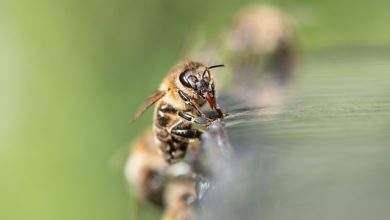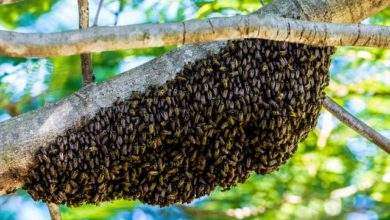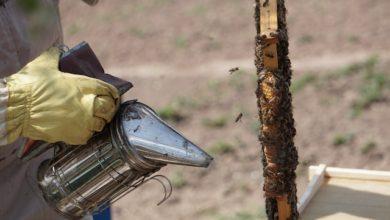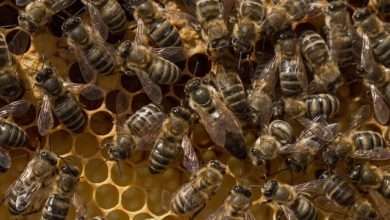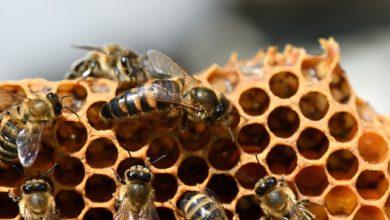Why Do Bees Follow Me?
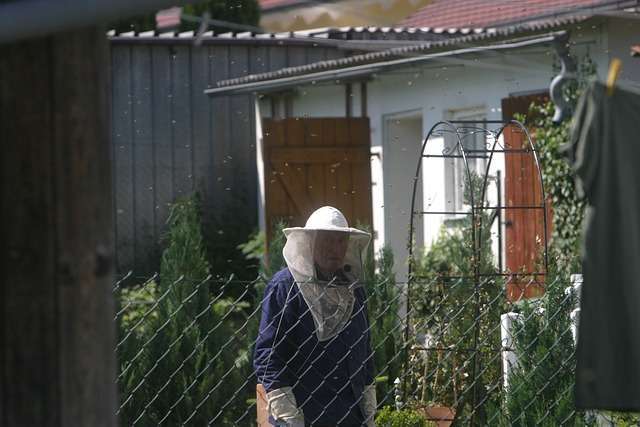
Do you have a bee following you around wherever you go? Like a bee to, um, honey, seeming attracted to you? There is probably nothing to be concerned about, so do not be!
If a single bee is hovering around you, it is likely that bees are drawn to you due to your clothing, perfume, or something sweet you are consuming. If you don’t try to hurt them, they will leave you alone eventually.
However, if there are more bees pursuing you, it is possible that they do so because they see you as a danger to their colony. If so, you need to get out of there right away.
Reasons Bees Follow You Around:
There will be a valid cause if a bee follows you. Here are the most typical explanations for why a bee might be following you:
- Your Clothes Look Like Flowers
Because they must locate flowers to gather nectar and pollen, bees depend on their vision to survive. Bees are capable of seeing many hues, just as humans. They remember particular hues and have associations with various things, according to experiments.
Because most creatures that pose a threat to bees have dark fur, for instance, bees tend to link dark hues like black with predators (which is why beekeepers wear white).
The same goes for bees, who have the ability to recall and relate various hues and patterns to certain flowers. If you are wearing bright, pattern-covered clothing and a bee is following you, it is possible that they think you are wearing flowers because of your attire.
- They Are Attracted to Your Scent
Bees have a keen sense of smell that allows them to detect various scents while in flight. When searching for food, they employ their ability to distinguish between different blooms.
A bee may be drawn to you due to your perfume if it follows you. Maybe the scent of your deodorant or cologne reminds them of flowers. Because of this, it’s a good idea to avoid wearing any fragrances while checking on a hive.
- You Have Something Sweet
Nectar, which contains a variety of carbohydrates, is what worker bees forage for. As a result, delicious things draw their attention.
There is a possibility that the bee is following the sweet scent of your soft drink, chocolate bar, or piece of fruit if it is following you and you are carrying any of those items. They will continue to follow you unless you hide it or get rid of the sweet substance.
- They View You as A Threat
In general, bees are amiable animals. They might attack you, though, if they believe you to be a danger to their hive.
It is extremely unlikely that any bees you see following you are a threat. However, if you are in close proximity to their hive and more than one bee is pursuing you, it may be an indication that they perceive you as a threat.
Bees send out alarm pheromones to the colony to let them know they are in danger. In order to defend the hive, this attracts additional bees to the region. It’s very likely that the bees will strike you if they do perceive you to be a threat.
What To Do If a Bee Is Chasing You
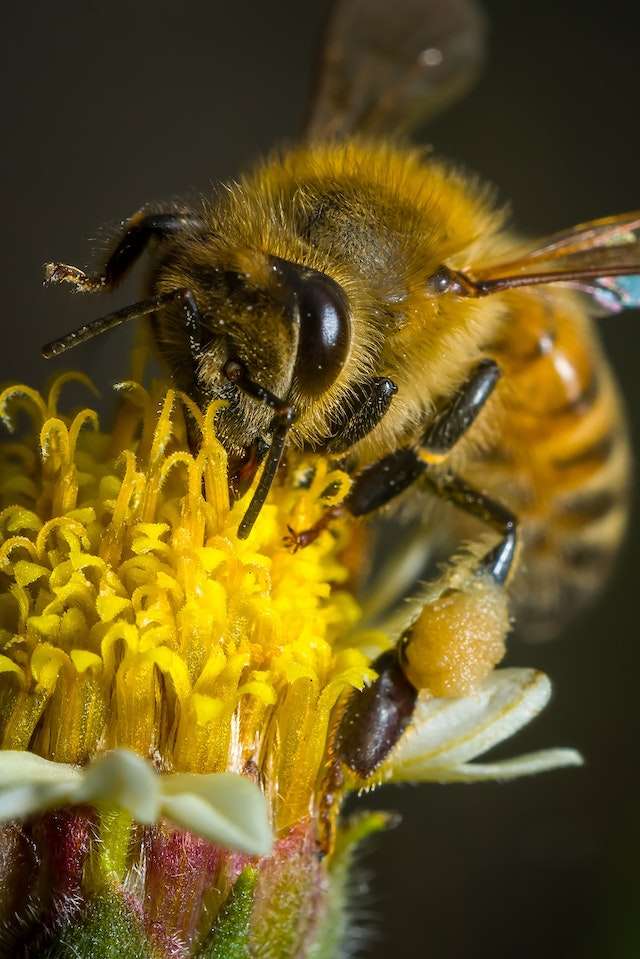
It is crucial to know what to do if a rogue bee is chasing you in order to lessen the likelihood that you will get stung. What you should do is as follows:
- Do not Make Sudden Movements or Swat the Bee Away
Bees are covered in microscopic hairs that are vibration-sensitive. Bees become startled if they notice an unexpected vibration frequency, like a quick movement.
Therefore, if a bee is following you, you must maintain your composure. Avoid jerky movements and refrain from attempting to swat it away. It will simply make the bee feel threatened, and it might sting you as a result.
- Cover Your Mouth and Nose
Carbon dioxide is recognizable to bees. As a result, your mouth and nose are where they usually sting the most.
The pain and swelling from getting stung on your face can be severe. So it is a good idea to shield your face if bees are following you and you are concerned that they might harm you.
- Do Not Try and Kill It or More Bees Might Come
A bee’s chances of returning increase if you attempt to kill it. This is due to the fact that bees who are in distress produce alarm pheromones. Other bees will then be alerted to the danger in the area by this.
When a bee stings you, the alarm pheromone is also released. Therefore, you should instantly leave the beehive if you are stung. Remove the stinger.
This is particularly true if you think the stingers are those of honeybees that have been adapted to live in Africa, as they strike with greater vigor. Unlike European honeybees, they will pursue you over greater distances, which makes them potentially deadly.
- Go Indoors to Hide from The Bee
Try moving inside if a bee is following you relentlessly and making you feel uneasy. In an enclosed area, try to find a door that you can close to keep the bee out. Before heading back outside once more, you can always wait until it has left.
Do Bees Chase You When You Run?
Even if you flee, a bee that is pursuing you will keep going if they have a valid reason to. Even worse, bees may perceive unexpected movements as a threat, making breaking into a sprint an even more dangerous maneuver. If that is the case, the bee will probably follow you and attempt to sting you.
What To Do If a Bee Lands on You
A worker bee out searching for pollen or nectar who has stopped to rest if a stray bee lands on you is most likely the cause. They might also be drawn to you if you are eating or drinking anything delicious, or they might believe that you are a flower if you are wearing vivid colors.
If a bee does fall on you, all you need to do is keep your cool. It is very improbable that they will sting you. They will soon understand that you are not a flower and do not contain pollen or nectar and will depart.
The bee can perceive you as a threat and sting you if you hop up and down, wave your hands, or attempt to squash it but fail. However, if you do nothing, they will ultimately fly off and resume their hunting.
What To Do If a Bee Bumps into You
Bees will send out guards that head-butt or bump into you if you get too close and pose a threat to their colony. At this point, they only want to warn you for going too close; they do not intend to sting you.
Do not flee if a bee swoops down on you. Bees may become alarmed and launch an assault as a result of this abrupt movement. The best course of action is to gradually move away from the hive until they leave you alone.
Some people think that when a bee stoops on you, it also marks you with an alarm pheromone that alerts the other bees in the hive that you are a threat. If you stay where you are after a bee headbutts you, more bees will probably congregate and launch an attack.
Summing Up … Why Bees Are Attracted to You
In addition to floral designs and scents, sugary compounds also draw bees. A solitary bee may be drawn to you if you are eating something sweet, wearing clothing or perfume that reminds them of flowers, or any of these things.
Keep your composure and avoid erratic behavior. In due course, the bee will become disinterested and leave.
But you should leave the area if there are many bees pursuing you. You do not want to get stung if they perceive you as a threat to their hive because of this.
FAQs
What does it mean if a bee follows you?
- Some bees are drawn to human perspiration. It might sound disgusting, but it is true. These bees are often metallic in color, smaller, and more difficult to spot than their yellow and black cousins. Although they have been known to sting, these bees are not known to be hostile toward people.
What to do if a bee keeps following you?
- The instant it realizes you are not a flower, keep your composure and wait a bit; it will then move on. If you do not want to wait, you can blow a little air at the bee to get it to fly away or gently brush the bee away with a piece of paper.
Should you stand still if a bee is near you?
- You run the risk of startling any bees nearby with your abrupt retreat. Additionally, if you are close by, bees can see your speed as a danger to their colony. We usually advise stepping slowly away from bees if you can avoid it.
Why do bees fly around your head?
- They could fly in your direction or flitter above your head. You should pay attention to these signals from the bees because they might be trying to warn you that you have entered their territory and are too close to their colony for both of you to feel safe.
Do bees chase you if you run?
- Running away, though, is probably going to make the sting worse. It moves suddenly, which bees detest. Additionally, bees will become more agitated as a result of them feeling threatened by your speed. Step cautiously and slowly away if a swarm is approaching you.
Can bees sense fear?
- Bees are not aware of fear. They do, however, pick up on fear pheromones that are generated when an animal or person is terrified. In essence, they are able to gather scents and interpret them thanks to their olfactory system. Therefore, despite not being able to directly smell fear, they have a good sense of smell for potential hazards.
Why not jump in the water when chased by bees?
- Jumping into a body of water, such as a swimming pool, has been attempted by some people. Killer bees have been observed to wait above the water until the victim comes up from the attack before resuming their attack. So, it is unlikely to be useful to jump into a body of water.
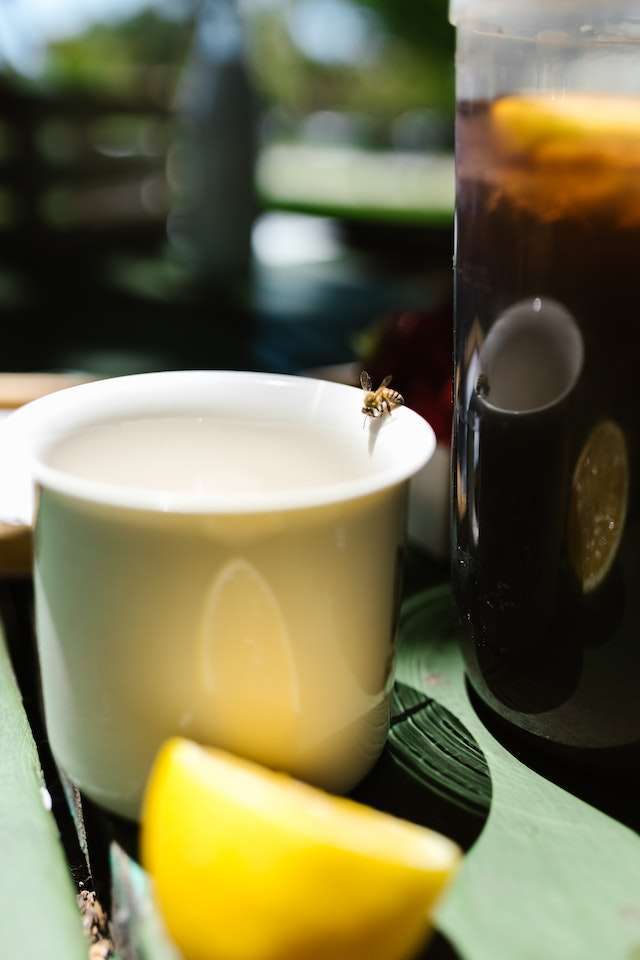
Why do bees hover over me?
- Many trips to the neighborhood flowers for a quick snack are necessary due to this hard work. The male carpenter bee’s action of hovering about people or even animals is an attempt to flex his muscles and scout out potential threats in his environment. Carpenter bee male aggression is obnoxious and frightening.
Will a bee sting you if you swat it away?
- Avoid swatting at buzzing insects because they may sting you if they sense danger. Keep your composure and move cautiously away from them.
How far will bees chase you?
- The ability to respond quickly varies among bee species. Bees of certain species, such as killer bees, will pursue you for up to 1/4 mile. Most “domesticated” bees will only chase for around a hundred yards, although there is a lot of variation.
Why do bees dive-bomb you?
- They might have passed just in front of you hovering, or you might have witnessed them dive-bomb. They may even be exhibiting mating behaviors while merely defending their nesting grounds. Carpenter bee females, on the other hand, can sting you painfully.
